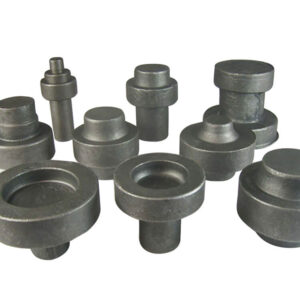defence forgings
What are Defense Forgings?
Defense forgings are metal components shaped under immense pressure (forging) specifically for defense and military applications. These are not standard parts; they are critical components where failure is not an option. They are characterized by superior strength, structural integrity, reliability, and the ability to withstand extreme conditions, including high impact, stress, and temperature variations.
Common Types of Defense Forgings & Their Applications
The range of defense forgings is vast, covering every branch of the military. Key examples include:
Vehicle Components: Tank track shoes, road wheels, suspension arms, and transmission parts.
Aerospace Components: Landing gear parts, engine mounts, turbine disks, and missile body sections.
Naval Components: Valve bodies, propeller shafts, hatches, and deck fixtures.
Firearm Components: Receivers, barrels, bolts, and other high-stress parts.
Artillery Components: Shell casings, gun mounts, and recoil mechanisms.

Why Choose Our Die Forging Process for Defense Components?
Our die forging method offers distinct advantages for defense manufacturing:
High-Volume Efficiency: Ideal for bulk orders, die forging produces large quantities of identical parts with minimal variation, ensuring consistency across your fleet.
Superior Strength: The forging process refines the metal’s grain structure, resulting in enhanced mechanical properties, including toughness and fatigue resistance.
Excellent Material Utilization: Compared to machining from a solid block, die forging shapes metal closer to the final net shape, significantly reducing material waste and cost.
Reliability & Consistency: Once the die is created, every subsequent forging is a perfect replica, guaranteeing predictable performance in every batch.
Material Selection for Defense Forgings
The choice of material is critical for performance and survival in the field. We work with a range of high-performance alloys, including:
Alloy Steels (e.g., 4140, 4340): For high strength-to-weight ratios and toughness.
Stainless Steels: For corrosion resistance in naval and harsh environments.
Titanium Alloys: For extreme strength and light weight in aerospace applications.
Aluminum Alloys: For lightweight structural components.
Superalloys (Inconel, Waspaloy): For high-temperature applications like jet engines.
Our engineering team will help select the optimal material based on your application’s required strength, weight, and environmental resistance.

How We Ensure Quality in Every Defense Forging
Quality is non-negotiable. Our integrated quality assurance system includes:
Stringent Process Control: Monitoring and controlling every step of the forging process, from heating to final stamping.
Non-Destructive Testing (NDT): Employing techniques like ultrasonic testing, magnetic particle inspection, and dye penetrant testing to detect internal and surface flaws.
Dimensional Inspection: Using precision tools and CMMs to verify that every part conforms exactly to the specified drawing.
Material Certification: Providing full traceability and material test reports for all raw materials used.
Heat Treatment: Precisely controlled tempering, quenching, and annealing to achieve the desired hardness and mechanical properties.
Custom Defense Forgings from Your Drawings
We understand that defense projects often require bespoke solutions. We specialize in producing custom defense forgings directly from your technical drawings and specifications. Our engineering team will collaborate with you to ensure the forged component meets all performance, dimensional, and material requirements.
Ready to Source High-Quality Defense Forgings?
Contact us today to discuss your project requirements. As your trusted die forging partner, we are committed to delivering robust, reliable, and cost-effective components for your most critical defense applications.
